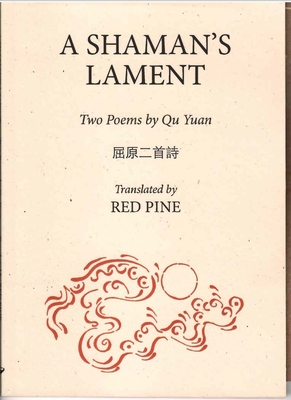A Shaman's Lament

A Shaman's Lament
Poetry. Asian & Asian American Studies. Translated by Red Pine. Before Qu Yuan (340-278 B.C.E.), poems in China read as if they could have been written by anyone. Qu Yuan changed this. It was his voice. He was a poet. Wang Wei once said he never traveled anywhere without taking two books with him: the Vimalakirti Sutra, from which he took his own pen name, and the poems of Qu Yuan. He wasn't alone. It's hard to find any Chinese poet of the past whose verse wasn't affected, if not inspired, by what Qu Yuan wrote and by the way he used language, his rhythms and his voice.
Poetry. Asian & Asian American Studies. Translated by Red Pine. Before Qu Yuan (340-278 B.C.E.), poems in China read as if they could have been written by anyone. Qu Yuan changed this. It was his voice. He was a poet. Wang Wei once said he never traveled anywhere without taking two books with him: the Vimalakirti Sutra, from which he took his own pen name, and the poems of Qu Yuan. He wasn't alone. It's hard to find any Chinese poet of the past whose verse wasn't affected, if not inspired, by what Qu Yuan wrote and by the way he used language, his rhythms and his voice.
Poetry. Asian & Asian American Studies. Translated by Red Pine. Before Qu Yuan (340-278 B.C.E.), poems in China read as if they could have been written by anyone. Qu Yuan changed this. It was his voice. He was a poet. Wang Wei once said he never traveled anywhere without taking two books with him: the Vimalakirti Sutra, from which he took his own pen name, and the poems of Qu Yuan. He wasn't alone. It's hard to find any Chinese poet of the past whose verse wasn't affected, if not inspired, by what Qu Yuan wrote and by the way he used language, his rhythms and his voice.
PRP: 115.73 Lei
Acesta este Pretul Recomandat de Producator. Pretul de vanzare al produsului este afisat mai jos.
104.16Lei
104.16Lei
115.73 LeiIndisponibil
Descrierea produsului
Poetry. Asian & Asian American Studies. Translated by Red Pine. Before Qu Yuan (340-278 B.C.E.), poems in China read as if they could have been written by anyone. Qu Yuan changed this. It was his voice. He was a poet. Wang Wei once said he never traveled anywhere without taking two books with him: the Vimalakirti Sutra, from which he took his own pen name, and the poems of Qu Yuan. He wasn't alone. It's hard to find any Chinese poet of the past whose verse wasn't affected, if not inspired, by what Qu Yuan wrote and by the way he used language, his rhythms and his voice.
Poetry. Asian & Asian American Studies. Translated by Red Pine. Before Qu Yuan (340-278 B.C.E.), poems in China read as if they could have been written by anyone. Qu Yuan changed this. It was his voice. He was a poet. Wang Wei once said he never traveled anywhere without taking two books with him: the Vimalakirti Sutra, from which he took his own pen name, and the poems of Qu Yuan. He wasn't alone. It's hard to find any Chinese poet of the past whose verse wasn't affected, if not inspired, by what Qu Yuan wrote and by the way he used language, his rhythms and his voice.
Poetry. Asian & Asian American Studies. Translated by Red Pine. Before Qu Yuan (340-278 B.C.E.), poems in China read as if they could have been written by anyone. Qu Yuan changed this. It was his voice. He was a poet. Wang Wei once said he never traveled anywhere without taking two books with him: the Vimalakirti Sutra, from which he took his own pen name, and the poems of Qu Yuan. He wasn't alone. It's hard to find any Chinese poet of the past whose verse wasn't affected, if not inspired, by what Qu Yuan wrote and by the way he used language, his rhythms and his voice.
Detaliile produsului








